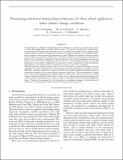Por favor, use este identificador para citar o enlazar a este item:
http://hdl.handle.net/10261/93827COMPARTIR / EXPORTAR:
 SHARE SHARE
 CORE
BASE CORE
BASE
|
|
| Visualizar otros formatos: MARC | Dublin Core | RDF | ORE | MODS | METS | DIDL | DATACITE | |

| Título: | Reassessing statistical downscaling techniques for their robust application under climate change conditions |
Autor: | Gutiérrez, José M. CSIC ORCID ; San-Martín, Daniel; Brands, Swen CSIC ORCID CVN; Manzanas, Rodrigo CSIC ORCID; Herrera, Sixto CSIC ORCID CVN | Palabras clave: | Statistical forecasting Climate change Climate prediction Statistical techniques |
Fecha de publicación: | 2013 | Editor: | American Meteorological Society | Citación: | Journal of Climate 26(1): 171-188 (2013) | Resumen: | The performance of statistical downscaling (SD) techniques is critically reassessed with respect to their robust applicability in climate change studies. To this end, in addition to standard accuracy measures and distributional similarity scores, the authors estimate the robustness of the methods under warming climate conditions working with anomalous warm historical periods. This validation framework is applied to intercompare the performances of 12 different SD methods (from the analog, weather typing, and regression families) for downscaling minimum and maximum temperatures in Spain. First, a calibration of these methods is performed in terms of both geographical domains and predictor sets; the results are highly dependent on the latter, with optimum predictor sets including near-surface temperature data (in particular 2-m temperature), which appropriately discriminate cold episodes related to temperature inversion in the lower troposphere. Although regression methods perform best in terms of correlation, analog and weather generator approaches are more appropriate for reproducing the observed distributions, especially in case of wintertime minimum temperature. However, the latter two families significantly underestimate the temperature anomalies of the warm periods considered in this work. This underestimation is found to be critical when considering the warming signal in the late twenty-first century as given by a global climate model [the ECHAM5-Max Planck Institute (MPI) model]. In this case, the different downscaling methods provide warming values with differences in the range of 1°C, in agreement with the robustness significance values. Therefore, the proposed test is a promising technique for detecting lack of robustness in statistical downscaling methods applied in climate change studies. © 2013 American Meteorological Society. | Versión del editor: | http://dx.doi.org/10.1175/JCLI-D-11-00687.1 | URI: | http://hdl.handle.net/10261/93827 | DOI: | 10.1175/JCLI-D-11-00687.1 | Identificadores: | doi: 10.1175/JCLI-D-11-00687.1 issn: 0894-8755 e-issn: 1520-0442 |
| Aparece en las colecciones: | (IFCA) Artículos |
Ficheros en este ítem:
| Fichero | Descripción | Tamaño | Formato | |
|---|---|---|---|---|
| Reassessing statistical.pdf | 4,78 MB | Adobe PDF |  Visualizar/Abrir |
CORE Recommender
SCOPUSTM
Citations
140
checked on 14-may-2024
WEB OF SCIENCETM
Citations
124
checked on 29-feb-2024
Page view(s)
370
checked on 14-may-2024
Download(s)
453
checked on 14-may-2024
Google ScholarTM
Check
Altmetric
Altmetric
NOTA: Los ítems de Digital.CSIC están protegidos por copyright, con todos los derechos reservados, a menos que se indique lo contrario.
